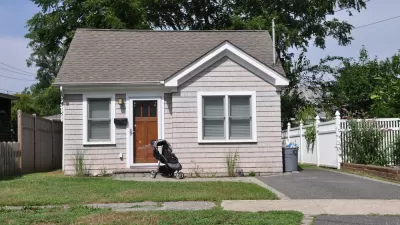On the heels of the Obama Administration's Housing Development Toolkit, Jonathan Coppange examines how federal policy has distorted the housing market.

Jonathan Coppange, a visiting senior fellow at the R Street Institute researching urbanism and civil society, writes an in-depth op-ed describing the effects of federal policy on the country's housing market. Coppange's core claim: "the Federal Housing Administration has to relegalize Main Street."
Coppange credits FHA standards for loans for the federal prohibition of Main Street in smaller and distressed communities. "To this day," writes Coppange, "FHA standards for loans, which set the market for the entire private banking sector, prohibit any but the most minimal commercial property from being included in residential development."
"As a groundbreaking report [pdf] by New York City’s Regional Plan Association found, these standards are 'effectively disallowing most buildings with six stories or less,'" adds Coppange. "And depending on the program, a building could have to reach to 17 stories before it is eligible for participation in the normal housing markets."
In addition to supporting some of the recommendations included in the Obama Administration's Housing Development Toolkit, Coppange also suggests raising caps on commercial space and income. Although some of the commentary following the Obama Administration's release of the toolkit noted the Executive Branch's lack of influence over housing policy at the local level, Coppange insists that even with local reforms, "small-scale building efforts would too often die in the halls of the FHA and the Department of Housing and Urban Development."
FULL STORY: To end the affordable housing crisis, Washington needs to legalize Main Street

Planetizen Federal Action Tracker
A weekly monitor of how Trump’s orders and actions are impacting planners and planning in America.

Map: Where Senate Republicans Want to Sell Your Public Lands
For public land advocates, the Senate Republicans’ proposal to sell millions of acres of public land in the West is “the biggest fight of their careers.”

Restaurant Patios Were a Pandemic Win — Why Were They so Hard to Keep?
Social distancing requirements and changes in travel patterns prompted cities to pilot new uses for street and sidewalk space. Then it got complicated.

San Francisco Suspends Traffic Calming Amidst Record Deaths
Citing “a challenging fiscal landscape,” the city will cease the program on the heels of 42 traffic deaths, including 24 pedestrians.

California Homeless Arrests, Citations Spike After Ruling
An investigation reveals that anti-homeless actions increased up to 500% after Grants Pass v. Johnson — even in cities claiming no policy change.

Albuquerque Route 66 Motels Become Affordable Housing
A $4 million city fund is incentivizing developers to breathe new life into derelict midcentury motels.
Urban Design for Planners 1: Software Tools
This six-course series explores essential urban design concepts using open source software and equips planners with the tools they need to participate fully in the urban design process.
Planning for Universal Design
Learn the tools for implementing Universal Design in planning regulations.
Heyer Gruel & Associates PA
JM Goldson LLC
Custer County Colorado
City of Camden Redevelopment Agency
City of Astoria
Transportation Research & Education Center (TREC) at Portland State University
Camden Redevelopment Agency
City of Claremont
Municipality of Princeton (NJ)





























